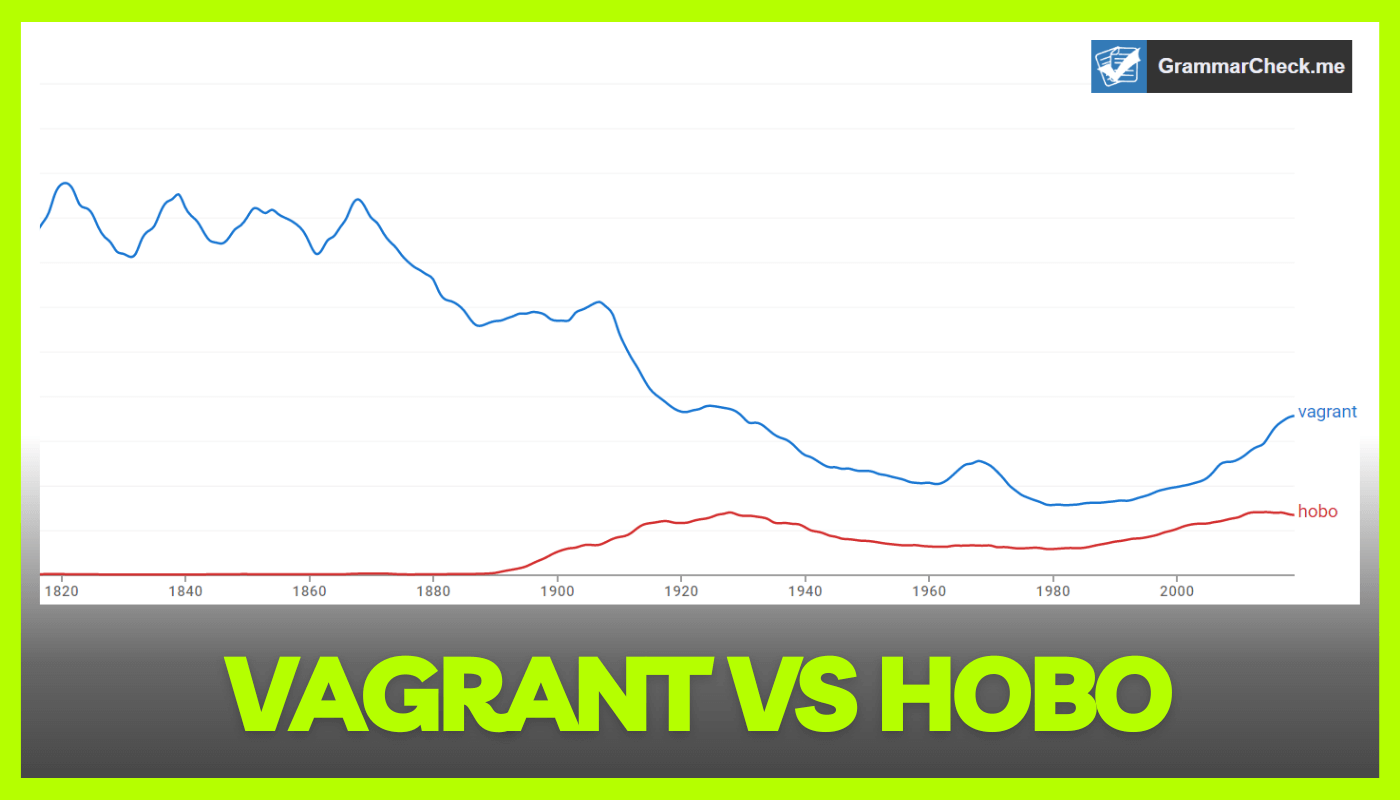It is no secret that the English language is full of words that can be easily confused. Take beside vs besides for example. Understanding the difference between vagrant vs hobo is a great example. We have all passed a person who lives on the side of the road. But what is this person? In this post, we’ll explore the difference between vagrant and hobo so that you don’t make this simple mistake.
Always using the right words? Make sure:
Check Your TextWhat’s The Difference Between Vagrant vs Hobo?

Just like with the words , it can often be tough to pick the right word. Just like ware or wear for example. Hobo and vagrant is no exception. These two very similar words are often confused by people. So, what’s the difference?
- Vagrant – Unlike hobos, vagrants tend to live on the streets in one specific area, most commonly in cities (i.e. New York). Vagrants are more prone to traveling with their belongings on the streets or in temporary shelters.
- Hobo – Compared to vagrants, hobos maintain a much more nomadic lifestyle. They roam the country looking for work (migratory worker) and fixed housing. In most cases, the survive out of a small bag with very little tieing them to a specific location.
Just like we saw with the words contemptuous vs contemptible, small spelling changes can make a huge difference! Pay close attention to your word choice.
Takeaway: While both lifestyles are very tough and lack fixed housing, vagrants usually stay in one specific area and hobos are more nomadic.
When To Use Hobo
The term “hobo”, like the term homeless, refers to someone that lives on the street. Just like the words yep or yup are short for yes, hobo is short for homeless.
- More specifically, a hobo is more of a professional wanderer who roams the country.
The term “hobo” has been around for decades and has a negative connotation. It is considered polite to call a person “a hobo” to their face. Usually, hobos are people who travel of their own accord and very rarely settle in one location.
Sentence examples
- The hobo walked down the street, hands in his pockets and head bowed low.
- Cindy was told she was acting like a real hobo when she refused to clean her room.
- John is a hobo who travels from city to city with no visible means of making money.
- In an old movie, an energetic young man escaped the cops by dressing up like a hobo.
- A hobo is a person that spends his or her life roaming the country looking for work.
Just like we saw in our post on what does ol mean, spelling & word choice make a big difference in the meaning of a sentence!
When To use Vagrant
As we already mentioned, the word “vagrant” is a legal term for a homeless that lives on the street. As opposed to a hobo, vagrants typically stay in one area more often than not.
- For example, if you live in NYC there are homeless people that you see on the same corner everyday for years!
There is no denying that this can be a very tough way to live. However, there are a few rare people who choose to live this way.
Sentence Examples
- The city had a large population of vagrants who were struggling to survive on the streets.
- There is a poor vagrant that has lived under the same bridge for years.
- I surprisingly really liked Steve, who is the neighborhood begging vagrant.
- Despite the challenges they faced, the vagrants were a resilient and resourceful group that always finds a way to survive.
- The local homeless shelter was very generous to the vagrants & offered them free housing.
Which Word Is More Popular?

After reviewing Google’s ngram data it is obvious that vagrant is the more popular term in published literature. This is likely due to the fact that vagrant is slightly more formal than hobo, which is seen as slang for a homeless person. Just like “where are you at” is slang for “where are you?”
Just like we saw when comparing the words rarer vs more rare, we see that the popularity of vocabulary changes with time. The term vagrant is significantly less popular than it was in the late 1800’s and early 1900’s.
Bum vs Hobo
Both “bum” and “hobo” are informal terms, just like the words hun vs hon, used to refer to homeless people. However, they have slightly different connotations and are used in different contexts.
- “Bum” – Generally seen as a derogatory or negative term to refer to a homeless person. It has the connotation of a lazy or intelligent person.
- “Hobo” – Refers to a homeless person who is a migrant worker and travels a lot. Although this is not a positive term, it does not have as negative of a tone as “bum”. It is more used to mean nomadic than as an insult.
Frequently Asked Questions
There is some overlap in the definitions of “vagabond” and “hobo”, but there are also some key distinctions. A vagabond is someone who wanders from place to place without a permanent home or job, while a hobo is someone who travels in search of work. So generally speaking, a vagabond is more likely to be unemployed and homeless, while a hobo may have a job but still travel around looking for better opportunities.
Yes, the word “hobo” could be offensive if used in the wrong context. It originated from the phrase “Homeless On Board” which was used to describe railway workers who would jump on and off trains in order to avoid being labeled as vagrants. The word hobo comes with the assumption that you are leading a vagrant and miserable life, which is not always the case.
Yes, a hobo is typically considered to be a homeless person. The term “hobo” comes from the phrase “homeless vagrant”, and usually refers to someone who travels from place to place in search of work (migrant worker) or food.
A female hobo is called a bo-ette. Bo-ettes are women who travel with hobos and are known to do the cooking and cleaning for the group. They are considered a penniless person who spends their life roaming looking for food and adequate shelter.
You should avoid calling someone a vagrant. Calling someone a vagrant beggar is rude and considered to be impolite.
The Bottom Line
Now you know that a vagrant, homeless person, and vagrant are NOT the same thing. In real life, you should avoid calling homeless people by these names. It can be perceived as rude! Have sympathy for people as you never know what people are going through. And if you have trouble getting this spelling rule right, use our grammar correct tool completely FREE. Tools like this make mastering spelling and grammar rule!
